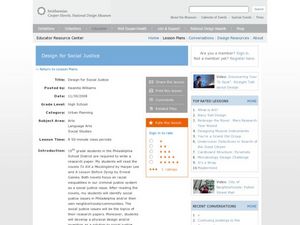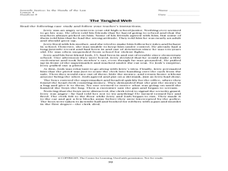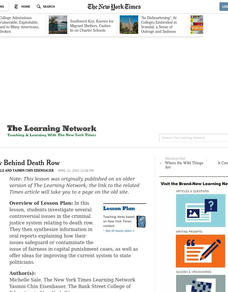Judicial Learning Center
Types of Court Cases
How can one court acquit someone of a crime, while another convicts the person of the same one? It's all because of the differences between civil and criminal trials. An informative resource provides scholars in the field of criminology...
Judicial Learning Center
The Judge and the Jury
Unless you are a lawyer, you might not understand just how unrealistic Law and Order and other legal dramas actually are. Here's a great resource to help scholars of criminology gain a more realistic perspective. The lesson outlines the...
Judicial Learning Center
Your 4th Amendment Rights
Americans love to learn about their rights, especially those that protect them from the government's power to invade their privacy. Young people are especially engaged by this topic. An informative lesson explores four Supreme Court...
Curated OER
Government Lesson Plan: Lesson Plan 9
Students examine and compare/contrast the steps of criminal and civil cases. They define key vocabulary terms, develop an outline of a criminal and civil trial, and analyze the differences in standards of proof in legal cases.
Curated OER
Teens on Trial
Students read about the public reaction to the conviction of Alex and Derek King, and explore the issue of child offenders being tried and sentenced as adults. They compose letters to Florida Governor Jeb Bush, outlining their opinion on...
Curated OER
Design for Social Justice
Students create a solution to a social justice problem within their community. In this urban planning lesson, students read To Kill a Mockingbird by Harper Lee and A Lesson Before Dying by Ernest Gaines. Students then complete a research...
Curated OER
Judges in the Classroom
Students define the legal meaning of juvenile and identify various ways to treat young offenders. They identify the current philosophy of the Utah juvenile justice system using a true/false worksheet and discussion format.
Judicial Learning Center
The Appeal Process
Why doesn't the Supreme Court hear testimony from witnesses? How do they complete an entire proceeding in less than two hours? A helpful lesson guides scholars of criminology through these and other questions by explaining how appeals...
Judicial Learning Center
Your 1st Amendment Rights
Why should classes care about the First Amendment? An engaging lesson serves as a powerful tool for answering just that. As all four cases in the lesson relate directly to freedom of expression in schools, young scholars explore the...
Judicial Learning Center
Why Study Landmark Cases?
Why study landmark Supreme court cases? A helpful lesson offers a brief but valuable argument for the importance of these cases in the field of criminology. It introduces scholars to some key terms necessary for studying court cases and...
Curated OER
The Youth Criminal Justice Act
Students review the Youth Criminal Justice Act and examine the consequences for young people who commit crimes. They investigate the rehabilitation and reintegration processes associated with the act.
Curated OER
Justice
Students consider the role of justice in the formation of the United States and in the operation of today's criminal justice system. They investigate symbols associated with justice and references to justice in the Constitution.
Curated OER
On Trial - Juvenile or Adult?
Students compare and contrast juvenile and adult courts in the United States. In this judicial system lesson, students read and discuss articles and statistics in order to determine why juveniles may be tried as adults and examine the...
Curated OER
The Juvenile Death Penalty
Sensitive material is discussed in this lesson. Please review to ensure that the content is suitable for your class. The topic is the Eighth Amendment and how the U.S. Supreme Court makes determinations about what constitutes cruel and...
Curated OER
Science in the Court Room
Share their opinions on the use of DNA databases in criminal investigations. After reading an article, they evaluate the pros and cons of the databases and work in groups to answer discussion questions. They write a letter to a state...
Judicial Learning Center
Your Day in Court
Whether out of choice or necessity, people want to know what will happen on a typical day in court. A helpful lesson walks scholars in the field of criminology through the trial process from opening statements to the final verdict.
Curated OER
Role Playing Free Speech
Young scholars conduct research into looking at a free-speech issue. They role play the events surrounding a court case. The lesson includes guiding questions to help create context and determine areas of further study. The presentation...
Judicial Learning Center
Judicial Independence
Most people support the idea of an independent judiciary in theory until they hear about a court case that violates their principles. An informative resource explains why the concept is important. It also provides scholars of criminology...
Curated OER
Justice at the Local Level: Is it Effective?
Students view a PowerPoint presentation on the court system. They are arranged into groups and evaluate the effectiveness of the criminal and civil courts in local Michigan communities.
Curated OER
Criminal Activities
Students investigate Justice Week in Britain. In this current events lesson, students visit selected websites related to law and order in the U.K. Students may create their own anti-social art as a culminating activity.
Anti-Defamation League
Exploring Solutions to Address Radical Disparity Concerns
The deaths of Michael Brown, Eric Garner, and Tamir Rice, and the protests that followed the 2014 shootings, are the focus of a current-events activity that asks class members to brainstorm and research possible strategies to address the...
Curated OER
The Jury's Still Out
Students examine the trials and executions of Nicola Sacco and Bartolomeo Vanzetti. In groups, they use the internet to research the impact of the executions in the shape of political cartoons and writings. They discuss an article to...
Curated OER
Lesson: The U.S. Westward Movement
Students research the U.S. Westward movement. In this U.S. history lesson, students research the topic, complete a creative writing activity for the lesson, and a design activity for the lesson.
Curated OER
The Row Behind Death Row
Students investigate several controversial issues in the criminal justice system relating to death row and give oral reports explaining how their issues safeguard or contaminate the issue of fairness in capital punishment. They offer...

























